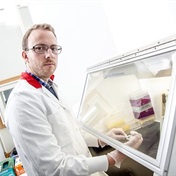This article has not necessarily been edited by Health24.
WEDNESDAY, Sept. 15 (HealthDay News) -- Patients suffering from a severe, inherited blood disorder may one day benefit from a new gene therapy and no longer need regular blood transfusions, new research suggests.
However, far more study is needed to determine whether the therapy is safe and effective. So far only one patient has received the experimental treatment, and the researchers have followed him for only three years.
The blood disorder -- beta-thalassemia -- occurs when a crucial blood protein known as beta globin is missing from the red blood cells that carry oxygen. Without beta globin, many of the red blood cells die off, causing severe anemia and eventually death if the person goes untreated.
Beta-thalassemia mostly affects people of Mediterranean, Middle Eastern, Southeast Asian and Chinese descent. Some 100,000 children are born with the disease each year around the world, according to the March of Dimes, and untreated, those with the most severe form usually die in childhood.
In those treated, the excess iron building up from the blood transfusions must be removed with chelating drugs, which can cause unpleasant side effects ranging from joint pain and vomiting to vision and hearing problems.
And even though lifesaving treatments have greatly improved prospects for long-term survival, those with the disorder are at risk of heart failure and other life-threatening complications -- some related to the treatments themselves -- as they age.
Among those struggling with this illness -- and often losing -- was a teenager who volunteered for the gene therapy. Like many others, he needed a matched donor for a stem cell transplant, but none was available, the study noted.
"The patient was 18 years old when we first treated him and [had been] transfused monthly for most of his life," said lead researcher Dr. Philippe Leboulch, a professor of medicine and cell biology at the University of Paris in France.
Transfusions continued until a year after the treatment, Leboulch said. "One year after the treatment he became transfusion-independent," he said. "That has been the case for over two years now."
For the study, Leboulch's team worked on a modified virus and removed all the viral genes. They then replaced those genes with a so-called globin gene. In addition, they added factors so the gene would act only on red blood cells, where the iron-rich protein known as hemoglobin normally carries oxygen throughout the body.
This new "gene" was then injected into the patient, where it went on to repair the damaged globin gene and started producing normal hemoglobin, Leboulch said.
"This is one more example of a gene therapy that starts to show a clinical benefit for patients," he said.
However, Leboulch is cautious. "This is the first patient in the trial. Of course we need to do more patients and see what happens," he said.
Leboulch noted another problem with gene therapy: the inability to control all the effects a new gene will have in the body. The globin gene, for example, appears to link to another gene that is involved in cell growth, causing a mild expansion of blood stem cells in the patient's body. This could account for some therapeutic benefits, but might also be a precursor to cancer, the researchers noted.
"So far there is no sign of any abnormality," Leboulch said.
Dr. Francoise Bernaudin, a clinical hematologist who has followed the patient since early childhood, said it was "wonderful to see that this young man is for now free of transfusions and injections for iron chelation.
"He is happy to have a normal life back, and for the first time has a full-time job as a cook in a main restaurant in Paris," said Bernaudin in a news release on behalf of bluebird bio, developer of the LentiGlobin gene therapy treatment that the researchers are using. The trials are sponsored by the Cambridge, Mass.-based bluebird bio.
The report is published in the Sept. 16 issue of Nature.
Based on their initial success with gene therapy, Leboulch's group plans to treat another two patients. If they also respond well, they will enroll "a larger cohort" of patients, he said.
In addition, the researchers plan to treat patients who have sickle cell disease with the gene therapy as well, Leboulch said. The same technique can be used for both diseases, he said.
Leboulch concedes that the treatment is very expensive. But he hopes that if it becomes widely used, the price will drop, eventually costing less than a lifetime of monthly transfusions and chelating drugs.
Dr. Mustafa Tekin, an associate professor at the John P. Hussman Institute for Human Genomics at the University of Miami Miller School of Medicine, said that "gene therapy has been long awaited for thalassemia."
"This is the first example of a successful gene therapy for beta-thalassemia," he said. "This brings great hope for patients for the final cure for the disorder."
However, there are possibilities of adverse effects, Tekin said. He joined the researchers in cautioning that treatment to date has been limited to just one patient.
Tekin said that the gene that absorbed the therapeutic gene is associated with certain cancers, such as leukemia. While the patient does not have signs of the cancer, it is important "to follow this patient for the long-term for signs of leukemia," he said.
More trials and patients are needed to really assess the effects and side effects of the treatment, Tekin said. Whether it will treat other forms of thalassemia isn't known, he added.
"One patient is important and a significant achievement, but you still need to see more patients to make sure that it works for many patients and also that it works safely," he said.
More information
For more information on thalassemia, visit the U.S. National Library of Medicine.
(Copyright © 2010 HealthDay. All rights reserved.)




 Publications
Publications
 Partners
Partners











